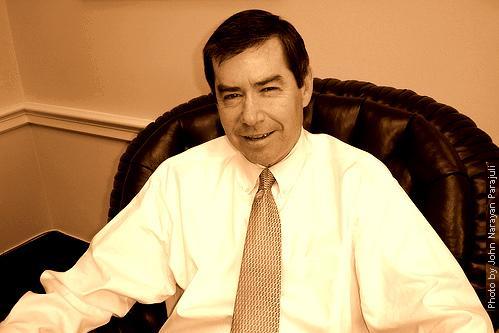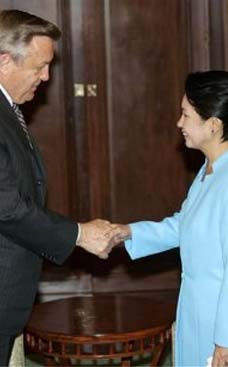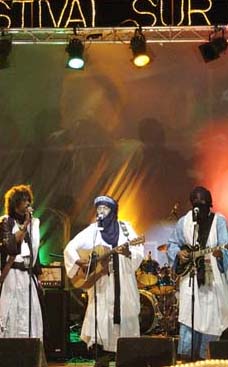
It goes back a long time. When I was just finishing up my college, I applied for the Peace Corps, and I was accepted in an agriculture program, which surprised me because I had very little practical agriculture experience. I was sent to Nepal. I lived in Nijgarh, Bara. Our district capital was Kalaiya. We had a dera in Birgunj that we shared with four-five of my Peace Corps friends. When we went to the district krishi bikas meeting, we would stay in the dera, and would take the bus back and forth to Kalaiya. It was a very bumpy ride. I worked with farmers in Nijgargh Pachayat. I worked with people who moved down from hills and people who were indigenous in the terai-- the tharus. I grew wheat, corn, rice vegetables. I did a little bit of everything. I was able to see a lot of Nepal while I was there. I traveled to the West: Pokhara and Annapurna, and to Namche and the Everest region. I try to, as best I could, maintain my ties with friends whom I lived with. I email back and forth. I obviously follow the politics and the recent changes in Nepal.
My hope is that I could go and observe the elections. That would be ideal. I think the elections are the critical event in the near term history of Nepal. But when I first came back here in 1991, and the government changed and democracy was established, we wrote to the king, and asked the king to respect the students and people who went to streets asking for democracy. And I saw the impact that the United States had, and I think that the United States continues to play a positive role encouraging democracy. So if I could go for the election, thatís when I would go. Dherai namaskar and namaste to mero daju bhai, didi bahinii, and I miss Nepal, and I am looking forward to coming back.
RPCV Congressman Jim Walsh takes a special interest in Nepal
Q & A: So Far So Good-- US Congressman Jim Walsh
printericon.gif Printer-friendly version
Caption: The only Nepali-speaking US Congressman tells JOHN NARAYAN PARAJULI that in Nepal, there should now be a contest of ideas and not weapons. Photo:

Congressman James T Walsh, a republican, has been in the Congress for the last 18 years. Perhaps, he is the only member in the Congress who speaks fluent Nepali and keeps a close tab on Nepal, where he served as a Peace Corps volunteer during 1970Ė72. Walsh was instrumental in drawing considerable Congressional attention to the political developments in Nepal last year and the years before. As the Chairman of the United States Congressí Friends of Ireland he was closely involved with the Northern Ireland peace process. He is an influential member of House Appropriations Committee of the Congress that controls the power of the purse. John Narayan Parajuli spoke to Mr. Walsh in his office recently in Washington, D.C. about his experience in the Congress, his connection to Nepal and his take on Nepalís peace process.
Jim_Walsh.JPG
Tell us about your experience in the new Congress.
Itís not as much fun as it was. Being in the minority, I donít get to make the decisions, I made before. I have to work with my new [Democratic] Committee Chairman and Subcommittee chairman. I have been here for 18 years, and I think I have the respect of my colleagues. And in areas where I am knowledgeable, I think I am still able to help make policy, and certainly will continue to follow issues of importance to me, and certainly Nepal is one of them.
Itís my impression that the Republican Congress held more hearing on Nepal last year than the new Congress. Is it party politics, or just the timing of the events?
I think itís probably timing and probably priorities. I was in a position where I can get other members to hold hearings because it was timely with the revolution and the ceasefire and there was a lot happening in Nepal in the last couple of years. And probably people think things are quieter now. But also I think there were Republicans members like myself, who wanted to get more public attention to what was happening in Nepal. Hopefully the Democrats will also do that.
Now you keep a close tab on Nepal. What is your connection with Nepal?
It goes back a long time. When I was just finishing up my college, I applied for the Peace Corps, and I was accepted in an agriculture program, which surprised me because I had very little practical agriculture experience. I was sent to Nepal. I lived in Nijgarh, Bara. Our district capital was Kalaiya. We had a dera in Birgunj that we shared with four-five of my Peace Corps friends. When we went to the district krishi bikas meeting, we would stay in the dera, and would take the bus back and forth to Kalaiya. It was a very bumpy ride. I worked with farmers in Nijgargh Pachayat. I worked with people who moved down from hills and people who were indigenous in the terai-- the tharus. I grew wheat, corn, rice vegetables. I did a little bit of everything. I was able to see a lot of Nepal while I was there. I traveled to the West: Pokhara and Annapurna, and to Namche and the Everest region. I try to, as best I could, maintain my ties with friends whom I lived with. I email back and forth. I obviously follow the politics and the recent changes in Nepal.
I understand that you are planning to go back to Nepal. Have you planned anything specific yet?
Actually my hope is that I could go and observe the elections. That would be ideal. I think the elections are the critical event in the near term history of Nepal. But when I first came back here in 1991, and the government changed and democracy was established, we wrote to the king, and asked the king to respect the students and people who went to streets asking for democracy. And I saw the impact that the United States had, and I think that the United States continues to play a positive role encouraging democracy. So if I could go for the election, thatís when I would go.
The Maoists have joined the government. Whatís your take on it?
I think itís very significant that they have decided to participate in democracy. It should now be a contest of ideas and not weapons. I am pleased to point that they have relinquished their weapons. I think it is very important that they honor that commitment; that they not continue to threaten violence.
They should forswear weapons, put them aside forever and participate in democracy truly and fully.
Do you agree with the administrationís policy of isolating the Maoists as long as they donít swear-off violence?
I donít know if I would be as strict as the administration. The Maoists have set aside their weapons, if that continues, that builds confidence. And there should be other confidence building measures for the Maoists, if they continue to respond in a positive way, I think we should engage them. I think the international community should engage them. But they have to continue to keep their word and swear-off violence, and not use the threat of violence. But the fact that they still have guns does make one pause.
You have been closely involved with the Northern Ireland peace process, whatís your experience? Is there a lesson Nepal can learn from it?
I think there are some parallels. In Northern Ireland, people think itís about religion. It was not really about religion. It was more about national aspirations. There is a group of people who align themselves with England; others align themselves with the republic of Ireland.
Basically there is a difference of opinion amongst people. The Republican and the Loyalists paramilitaries fought for 30 years, killed thousands of people. But they came to the conclusion that it would never be resolved militarily. They decided to work things out through ceasefire, elimination of weapons, what they referred to as ďputting weapons beyond use,Ē confidence building, dialogue, and comprise. And it has taken a lot timeó13 years since the ceasefire and they still donít have a government. But very soon they will. And it is going to require the same process [in Nepal]: patience and persistence. And it will require the international community to stay engaged, to watch whatís happening. Just as the United Nations has steeped-in in Nepal, a group of countries have involved themselves in the Northern Ireland.
Critics say the United States was rather soft on the Irish Republican Army (IRA), and that it is unwilling to be equally flexible on the Maoists. Does ideology play a role in such considerations?
ThereĎre subtle differences. My view is that if, as I said, if the Maoists continue to perform and keep commitments, we should engage them, we should talk to them. This is somewhat different than the administration. The administrations under President Clinton and President Bush, there were time when they would not deal with the IRA. They continued to consider them terrorists even after the ceasefire. I have always been of the opinion that you have to engage, you have to talk, break down barriers and build confidence.
I think the fact the Maoists are communists is more of a problem, although the IRA is very much a socialist organizations.
As a member of the House Appropriations Committee, will you be willing to sponsor a bill to increase funding for Nepal, if the Nepal government requests, or on your own initiative?
Yes. I have always supported the additional funding for Nepal. I think we need to be helpful with the election process.
I would very much like to see the United States working with international organization like the World Bank help Nepal to create and harness the hydroelectric power that it has. Nepal has vast hydro electric potential. Before the Maoists revolution began, there was some real movement on harnessing some of the rivers in Nepal. Itís somewhat environmentally controversial. But there are ways to harness that power that would make Nepal energy independent, in fact an energy exporter.
State Department officials say they donít want to been seen as competing with Indiaóin terms of assistance. Is that a fair benchmark?
India is certainly much closer to Nepal, physically, culturally and spiritually. But I think that the United States can play a positive role working with Nepalís neighbors in helping to coordinate activities. When I was there, you had Soviet Union, India and U.S. building the east west highway. Everyone was building a section. We should be able to continue to do that sort of thing.
How optimistic are you about the peace process?
So far so good. I really want to see the elections; I want to see the elections run fairly. I donít want to see any ballot intimidations by the Maoists or anyone else. I think Prime Minister Koirala is a remarkable man. I have met him a number of times. I think he has got the country headed in the right direction, but there are a lot of pitfalls between here and there. But I very hopeful that once the elections are over, the people of Nepal, who this is really ultimately about, will have the confidence that the government they elected is the government they wanted.
Anything you would like to add?
Just dherai namaskar and namaste to mero daju bhai, didi bahinii, and I miss Nepal, and I am looking forward to coming back.
*** ***
John Narayan Parajuli is a Nepali journalist. Pay a visit to his blog here.



















